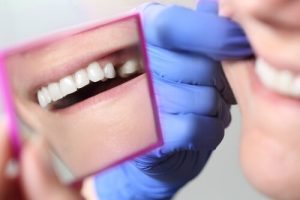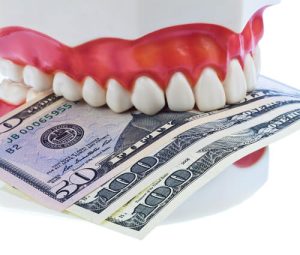Dental crowns are a tried-and-true treatment for restoring teeth that are worn down or damaged. Not only can they mend the look of your smile, but they also improve its function – and with them, you do not need to worry about dental implants or discolouration! Crowns bring back your natural tooth’s appearance and restore it to full health. Learn more information.
When your dentist advises you to get a dental crown, two queries might immediately spring up in your mind: What’s the best type of crown for me? And how much does it cost? In this blog post, we will explore different types of dental crowns, what factors can affect the price, and what you should expect when it comes to cost.
Dental crown: Do you need one?
Before you decide between a crown, an inlay, an onlay, or just a filling for your dental needs, how can you be certain that one of these options is the right choice?
After your initial visit, your emergency dentist will thoroughly examine you and advise you on the best course of action. Typically, some of the most typical reasons to get a dental crown are:
- A weakened tooth after severe decay or cavity
- To cover an implant. Read more about it.
- To replace a large filling
- A natural tooth that is damaged or cracked
- A tooth that has undergone a root canal (especially posterior teeth)
- To align your bite
- For aesthetics purposes, achieve a more beautiful smile by levelling the size, shape, and colour of your teeth.
What Type of Dental Crown Should I Choose? 5 Main Types
There is a wide array of dental crowns available today, and each type has varying materials, prices, procedures required, and patient needs to consider. When you need a crown for yourself or someone else, the variety of choices can be overwhelming—it’s important to know all your options before making an informed decision. Learn more details.
The main types of crowns used in dentistry include:
Gold crowns
Gold crowns are a mixture of copper and other metals, such as nickel or chromium, offering extraordinary strength and longevity. Whether you have them in your mouth for years or just one day, gold crowns will remain durable the entire time they stand there protecting your teeth!
Some dentists may advise a gold crown as the optimal option for back restorations, depending on each patient’s needs. Unfortunately, today’s modern patients are not particularly interested in this solution due to its colour and aesthetic appeal.
Main advantages of gold crowns:
- Their strength and durability are truly remarkable.
- With proper care, these crowns will last for years to come.
- A smaller portion of your original tooth must be removed, resulting in a more significant conservation of natural enamel.
- Just like natural enamel, these teeth resist wear and tear over a long period of time.
- These products offer an ideal solution for restoring back teeth, particularly second molars.
Main disadvantages of gold crowns:
- Poor aesthetics: It’s evident that these teeth do not possess the same aesthetic as natural teeth.
- While gold alloy crowns are an effective and popular option, they may cause undesirable side effects, such as allergic reactions or swelling in some individuals.
All-Porcelain Crowns
Porcelain crowns have rapidly become the go-to choice for dental care today. Their lightweight, durable, and aesthetically pleasing composition makes them an ideal option for many patients’ needs.
- Porcelain or ceramic crowns provide the best and most natural look. They match your surrounding teeth in shape, size, and colour.
- The best option for front teeth restorations.
- They are biocompatible, meaning no metal is used, so they are toxic-free.
However, the main disadvantages of porcelain crowns are:
- They are not as strong as metal crowns. Porcelain crowns can last long, but they must be well taken care of.
- Choosing gold for their Porcelain-fused-to-metal (PFM) restorations is the best option for those afflicted with bruxism.
- Although porcelain crowns may cost more than other dental restorations, such as metal crowns, they offer unparalleled aesthetic appeal.
Porcelain Fused-to-Metal Crowns (PFM)
Porcelain-fused-to-metal (PFM) crowns are another widely-used type of dental crown. They provide both strength (due to their metal structure) and aesthetics (due to the porcelain coat that covers the cap).
The main advantages of PFM crowns are:
- They provide great aesthetics and durability.
- They’ve been around for over 50 years. We know they work well.
- They are less costly than all-porcelain crowns.
However, the disadvantages of PFMs include the following:
- These metal crowns may produce a grey line along the gumline, thus failing to offer the flawless look that porcelain dental restorations possess.
- Individuals suffering from bruxism should be aware that the crown used for this treatment may not hold up to their grinding teeth and could face more wear and tear than usual.
Zirconia Crowns
Zirconium has recently become popular among many due to its strength and elegant aesthetics. Its high translucence and layered zirconia crowns provide an attractive finish sure to turn heads! With Zirconium, the perfect blend of style and sturdiness can finally be achieved.
Among the many advantages of zirconia crowns are the following:
They provide great aesthetics.
- They are strong and long-lasting (fewer possibilities of chipping or breaking).
- Using zirconia can complete the process much faster since it does not require sending it to a dental lab for cutting and shaping. Instead, the entire procedure is done in-house at your dentist’s office!
- Zirconia crowns are less likely to wear down due to their strength.
- As a metal-free crown, this biomaterial is not likely to cause an allergic reaction, making it the perfect choice for patients with sensitivities.
The main disadvantages of Zirconia crowns include the following:
- Their strength can make the teeth they bite against wear down easily.
- Adjusting solid zirconia can be a time-consuming and cumbersome task.
Dental Crown Cost
Now that you understand the various selections of dental crowns, you’re probably curious to discover the cost associated with each type. However, this price can differ depending on what material is used and how much preparation is needed. For example, porcelain crowns are typically more expensive than metal ones. Furthermore, a foundation build-up is necessary for certain scenarios to safeguard the tooth’s structure before attaching a crown.
In certain cases, dentists may need to perform a gingivectomy or minor gum surgery in the mouth involving cutting away part of the gums to ensure better aesthetics and prognosis for the teeth. Worst case scenario – you could require a root canal treatment which will double your overall cost significantly.
As a rough ballpark, the expense of a crown in Australia may vary from $1100 to even higher than $2000, depending on various factors such as your insurance coverage, the emergency dentist’s fees, and how many extra steps are necessary for treatment.
If you are searching for an affordable solution, consider investing in a resin crown. This type of restoration is prepared by your dentist and costs between $400-600, which can yield great savings compared to an outside lab-made crown. Essentially, it’s similar to having a large filling crafted right at your dental clinic!
Indirect resin crowns are the way to go when looking for a cost and time-efficient dental solution. They provide an affordable short-term fix without sacrificing the quality of care. However, these crowns may not last as long as others that offer longevity; nonetheless, they can be beneficial in certain situations where timely treatment is necessary.
Average Cost of a Tooth Crown
According to a rough estimate obtained through research, the price range of dental crowns per tooth today can be as follows:
The cost of gold crowns can range between $600-$2,500
- All-porcelain crowns can range between $800-$3,000
- Porcelain-fused-to-metal crowns can cost $500-$1,500
- Zirconia crowns cost approximately the same as all-porcelain crowns
Your insurance may cover up to 50% of the cost of a crown, based on the type and particular circumstances associated with it. However, suppose you are getting a crown for cosmetic reasons. In that case, chances are your policy won’t provide coverage—yet if the purpose is preventative (like protecting a root canal or fixing a cracked tooth), then there’s potential for reimbursement from your insurer (or at least partial compensation).
Factors affecting the dental crown cost
Material Used
Your dental crown’s expense is mainly determined by the material used in its fabrication. Porcelain-fused-to-metal (PFM) crown is a popular choice due to its sturdiness and a life-like appearance. Yet, it can be more costly than alternative materials like zirconia or all-ceramic crowns. To get an accurate estimate of what you will pay for your restoration, speak with your dentist about which option would best suit your needs and budget. Discover more.
Labour Costs
Not only can labour costs for a dental crown be expensive, especially if you need additional services such as emergency root canal therapy or tooth extraction beforehand, but they may also vary. This is contingent on where you live and your dentist’s experience level concerning the procedure being performed.
Insurance Coverage
Before undergoing a dental crown treatment, investigate how much your insurance covers. Most insurers will pay for some of the cost – however, always ask beforehand to confirm. Moreover, enquire about possible discounts when paying up-front or setting up an instalment plan before starting the procedure. Additionally, certain treatments may not be covered by any form of insurance, so make sure you are aware of these limitations, too, and check with your provider before booking an appointment.
Treatments before placing a crown

An implant acts as a substitute tooth root, crafted from titanium or zirconia. To finish the restoration process, a crown is added to it. In cases where multiple teeth are absent, implants can be utilised to hold bridges and dentures securely in place.
Dentist’s expertise
Periodontists are specialists in dental crowns. If you opt to get your crown from them, it may cost you a little more.
You can also visit a general dentist to place a crown. However, periodontists are trained to handle complex situations which may sometimes arise while placing a crown.
The experience level of your emergency dentist also matters. An experienced professional who is more skilled may charge you more for providing a specialised service.
Location
Practice in a prime location, like city centres, can charge you more than one in a distant location, simply because their rent costs are higher. If you are willing to travel an additional 10 – 30 minutes, you might find a practice that charges you less. Savings can be 10% or more.
The cost of a dental crown depends on several factors, including the type of material used, labour costs associated with the procedure, and whether or not insurance will cover any portion of the expense. It’s important to discuss these issues with your dentist before beginning treatment so that you know exactly what kind of expenses you can expect for your particular situation. Talk to our reliable and trustworthy dentists for advice. With proper research and planning, getting a quality dental crown does not need to break the bank!
References:
https://www.goodrx.com/conditions/dental-care/dental-crown-cost
https://www.colgate.com/en-us/oral-health/bridges-and-crowns/how-much-does-a-dental-crown-cost
https://www.newmouth.com/dentistry/restorative/crowns/
https://my.clevelandclinic.org/health/treatments/10923-dental-crowns




